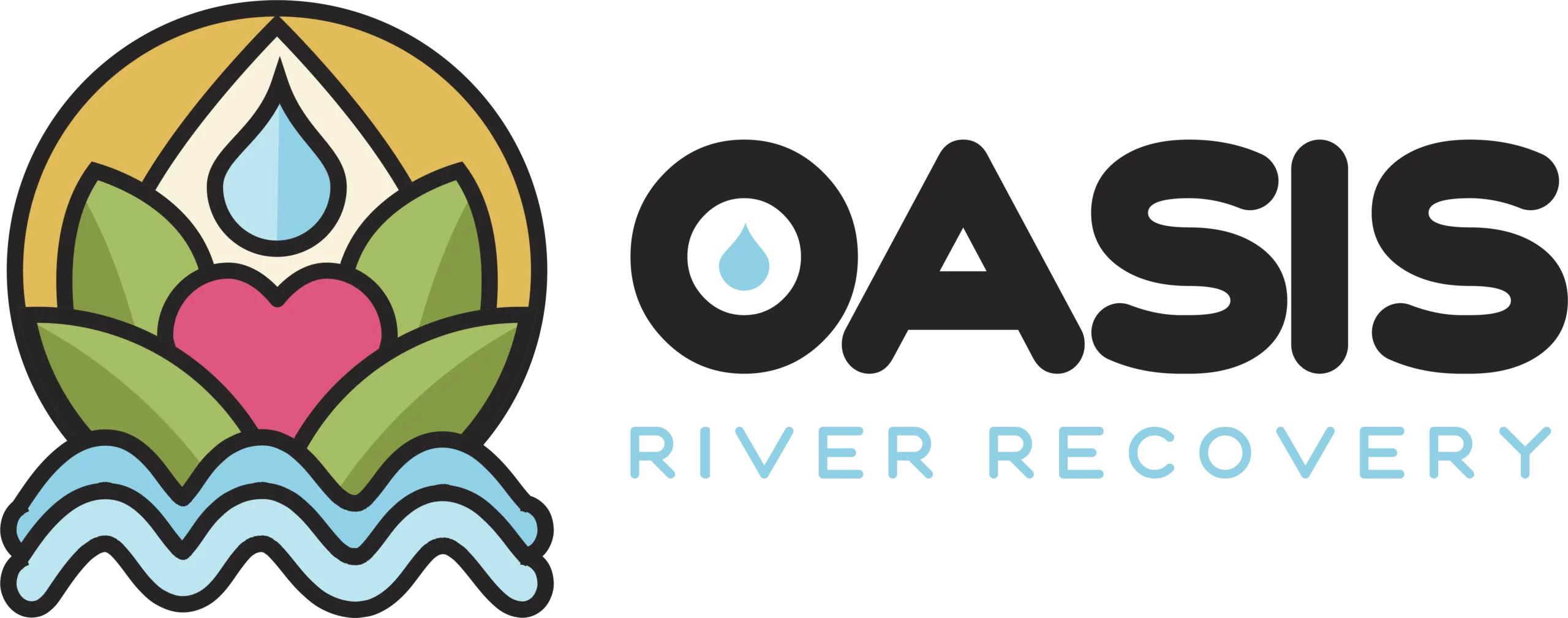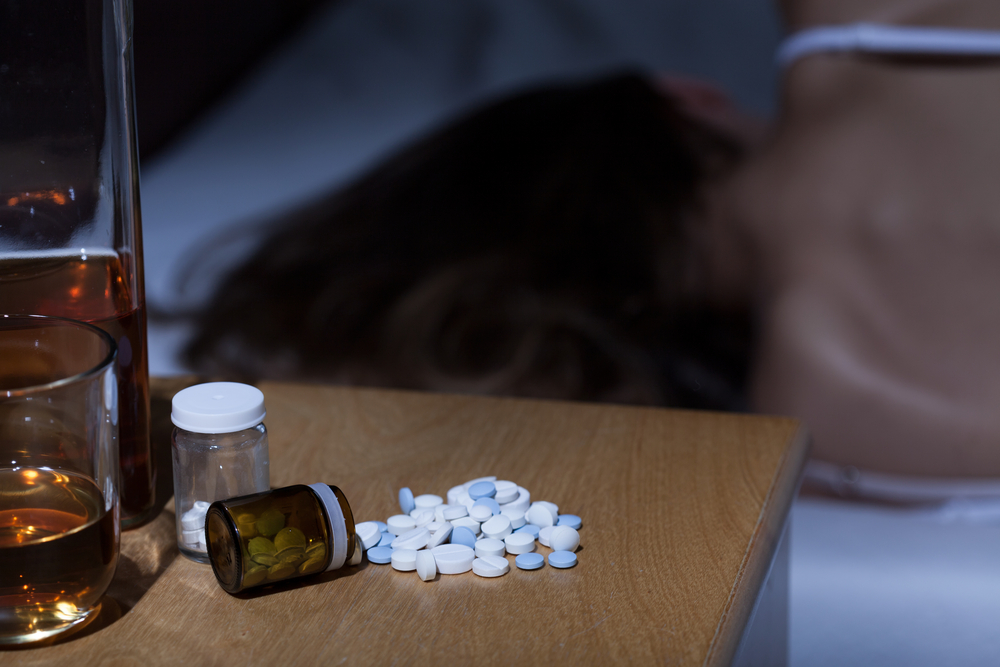If you’re thinking about or have tried mixing Ambien and alcohol, stop and read this informative article. Between 50 and 70 million Americans have sleep disorders, and around 84 million don’t meet the recommended amount of uninterrupted sleep. It’s safe to say anyone would consider a diet, supplement, or lifestyle change if it meant they could sleep better and longer.
In some cases, people might feel like their sleep troubles require strong and potent solutions, such as medically prescribed sedatives, one or more glasses of alcohol, or a dangerous combination of both.
This article explains what happens if you mix Ambien and alcohol, the most common reasons they’re combined, how it affects important neurotransmitters, how long you should generally wait before taking a second substance, and how to help someone who’s become addicted to or abuses multiple drugs.
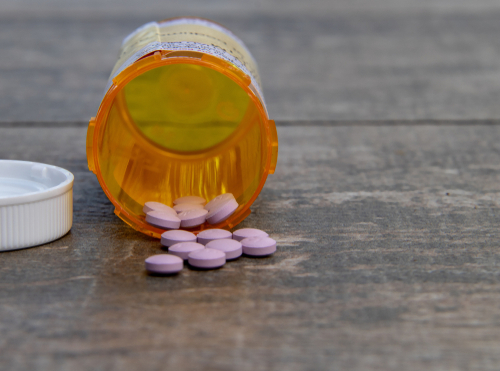
What Is Ambien?
Ambien is the brand name for zolpidem, a non-benzodiazepine, central nervous system depressant, and sedative used as a short-term treatment option for sleep problems and insomnia. Like Xanax and Ativan, Ambien is a Schedule IV controlled substance due to its various medical uses but high potential for misuse or abuse and is only approved for use in adults. Immediate-release Ambien tablets are designed to help people fall asleep right away, while the extended-release version, Ambien CR, has a second layer of zolpidem that slowly dissolves and activates during the night to help someone stay asleep.
Because of the body’s ability to build a tolerance to chemicals like zolpidem, Ambien should only be used for no more than one month, and Schedule IV prescriptions are only allowed to be filled and refilled up to five times. Some people might struggle with mental health disorders and insomnia, and their nights awake could be filled with anxiety, depressing feelings, negative thoughts, and suicidal ideations. However, using sedatives to fall asleep and calm racing thoughts can make the brain link drugs with feeling better, potentially leading to physical or psychological addiction.
Can Ambien And Alcohol Be Taken Together?
No, Ambien and alcohol should never be taken together because both substances are central nervous system depressants that can exacerbate each other’s intended effects and increase the risk of intense side effects. Separately, Ambien and alcohol slow your heart rate, respiratory rate, and brain activity, bringing you to a calm and euphoric state. Together, side effects include:
- Drowsiness
- Dizziness
- Delusions
- Delirium
- Memory loss
- Poor judgment (operating vehicles or heavy equipment)
- Inability to concentrate or express thoughts
- Loss of motor control
- Hallucinations
- Sleepwalking
Combining central nervous system depressants increases the risk of overdose. Signs of Ambien and alcohol overdose include:
- Slurred speech
- Slowed breathing
- Fainting
- Collapse
- Loss of consciousness
- Pale or blue skin, lips, and fingernails (lack of oxygen)
- Coma
- Death
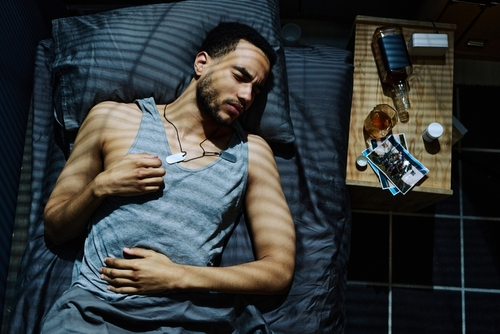
3 Reasons Why Someone Would Mix Ambien And Alcohol
There are three potential reasons someone might mix Ambien and alcohol:
#1 Drug abuse
Some of the side effects of Ambien can include drowsiness, dizziness, impaired coordination, and a feeling of being lightheaded or “drunk.” This can be appealing to people who have developed a tolerance to Ambien or alcohol and want to enhance each other without taking more of the same. Developing an addiction to two or more substances is classified as polysubstance abuse and requires more comprehensive addiction treatment to treat overlapping side effects and symptoms.
#2 Drug misuse
Someone might combine alcohol with their sleeping medication to increase the effects and fall asleep faster or longer. However, alcohol impacts the body’s ability to balance slow-wave sleep (deep sleep) and REM (dream sleep), worsening sleep quality. Many drugs negatively interfere with zolpidem and make it less effective, including over-the-counter medications like ibuprofen or Advil, vitamins, and herbal supplements, so it’s best to avoid taking any other drugs at the same time as Ambien.
#3 Intentional overdose
Some individuals are aware of the side effects of combining sedative medication with alcohol and are looking to induce an overdose intentionally. Most Ambien prescription doses fall between 5 to 10 mg, and lethal doses tend to be greater than 4,000 mg (400-800 times the average prescription). But by combining Ambien with another sedative, like oxycodone or fentanyl, a lethal dose can be as low as 1,100 mg.
If someone mentions overdosing on Ambien or alcohol, talk to them. Offer caring support and guide them to mental health specialists, articles, videos, or any resources that can assist them in dealing with these feelings. If someone has overdosed, call 911, try to keep the individual calm if they’re conscious, and wait for emergency services together.
How Do Ambien And Alcohol Affect GABA?
Both Ambien (zolpidem) and alcohol impact the function of gamma-aminobutyric acid (GABA), a neurotransmitter in the brain that plays a crucial role in inhibiting or slowing down neural activity.
Ambien primarily targets GABA-A receptors in the brain, binding to specific sites and enhancing inhibitory neurotransmission. This heightened GABA activity produces a calming effect, promoting relaxation and increasing sleep onset time.
Similarly, alcohol interacts with GABA-A receptors, increasing the opening of GABA-activated chloride channels and amplifying inhibitory neurotransmission. This GABAergic influence contributes to alcohol’s sedative and anxiolytic properties, creating an overall calming effect. When Ambien and alcohol are taken together, their combined effects on GABAergic activity can be additive.
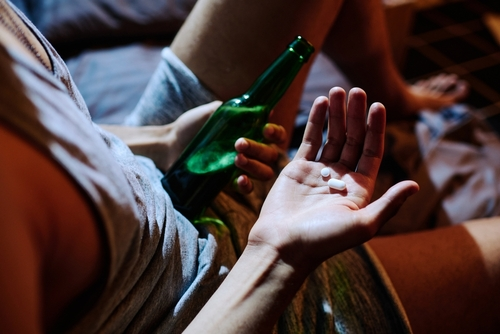
How Long After Drinking Can You Take Ambien?
You should always wait to drink alcohol or take Ambien until the other substance is completely out of your system. For reference, it takes one hour for a shot of liquor to metabolize, two hours for a pint of beer, 3 hours for a glass of wine, and more than 5 hours for multiple drinks. And it can take 10 to 17 hours for the body to eliminate 5 to 10 mg of Ambien. Additionally, Ambien and alcohol can have lingering side effects that disrupt the next day, including drowsiness, nausea, and vomiting, especially if someone doesn’t sleep well.
Ambien & Alcohol Abuse Treatment
Abusing multiple drugs can lead to polysubstance dependence, and users can struggle to quit on their own while experiencing multiple withdrawal symptoms, especially cravings and insomnia. To treat Ambien and alcohol abuse, addiction specialists recommended a treatment program that involves transitioning between intense and less intense levels of care. A typical Ambien and alcohol addiction treatment plan includes:
- Medical Detox: To safely and comfortably make it through withdrawal symptoms, we recommend a 3 to 5-day medical detox program. Clients are supervised by detox specialists and doctors who can provide comfort medication, on-site emergency care, and vocal encouragement and support.
- Inpatient or PHP: Once someone finishes a detox program, we recommend an inpatient or partial hospitalization program to establish essential and early recovery habits. These programs usually last between two weeks to 90 days, but it depends on the severity of the addiction and the individual’s responsibilities. However, the longer a client stays in treatment, the more likely they’ll stay sober longer.
- Outpatient: Eventually, individuals will transition back into their daily routine while attending an outpatient program. Clients go to therapy, attend group sessions, and engage with others and themselves through holistic healing modalities, such as yoga, meditation, art, and music.
- Aftercare: Graduating from an addiction treatment program isn’t the end of the recovery journey, and an aftercare plan can help clients maintain sobriety goals, learn and practice new coping skills, and keep in contact with other recovery alums.
Contact Oasis River Recovery
If you or someone you know is abusing Ambien and alcohol, contact Oasis River Recovery in Ocoee, Tennessee. Our addiction treatment center provides partial hospitalization treatment with on-site sober living facilities right next to Ocoee River. Our treatment center’s property gives us the space to offer ziplining, canoeing, hikes, slacklines, and other therapy methods designed to help clients ground themselves and find useful coping skills that replace unhealthy addictions and habits. Call today, and one of our admissions agents can help you get started.

